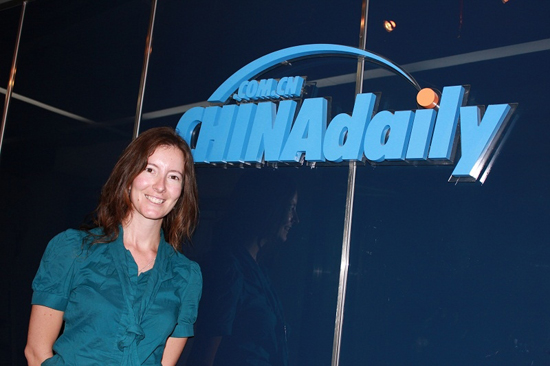
ANALYSIS: Students at Beijing's elite Tsinghua University can be forgiven for doing a double-take as they entered the school's No 4 building this week. No, they hadn't headed to their local shopping mall instead of the university campus. Rather, the name of a well-known clothes retailer, Jeanswest Clothing, had been added in flashy gold letters, to the outside of the building.
The university tells us that in April, Jeanswest Clothing agreed to a deal with the university to give money for the maintenance of the building and the replacement of equipment. In return, the building was this week branded with the company's name.
Students and alumni alike were reported as being aghast at such shameless commercialisation being sanctioned in Tsinghua's hallowed halls of academia.
Yet, accepting, in fact soliciting, corporate sponsorship is nothing new for Tsinghua University, nor is the concept unique to China. Around the world, particularly in North America, private funding is a vital component of many a university's operational budget.
But the practice is hotly debated, and certainly a no-holds-barred approach to a university accepting private dollars, particularly to fund research, presents a Pandora's box of ethical issues.
In 2008, the New York Times highlighted the issue of tobacco giants funding university activities in the US. Many universities voiced their unease regarding the appropriateness of partnering cigarettes, a vice, with education, a virtue. George Gau, dean of the University of Texas business school, which ended a long-standing funding arrangement with the parent company of tobacco maker, Philip Morris, explained the decision to the Times, saying, "The leadership of the school felt that in some sense it was tainted money, that it is money gotten from a product that is significantly harming people."
Another US university had no such qualms. According to the New York Times, the Virginia Commonwealth University had a secret pact to conduct research for Philip Morris. "The contract bars professors from publishing the results of their studies, or even talking about them, without Philip Morris’ permission," reported the Times in May 2008.
Independent research
At the core of any university is its ability to undertake robust, independent research. It is not, as one blogger put it, that such public-private partnerships are "intrinsically corrupting", but rather universities must be cautious to not buy into any deal that undermines good research protocols, including peer review processes, publishing findings in academic literature, and academia setting the research agenda. The degree to which Philip Morris called the shots in the case highlighted by the Times is simply not acceptable and sets a dangerous precedent for future private-public research partnerships.
Students at the University of Oregon are also pretty staunch when it comes to accepting so-called tainted money. Back in 2000, students gathered around their university's executive administration offices to protest the school's biggest donor, Nike.
Globally, criticism of Nike's use of child labor in developing world factories, unwittingly or not, was gaining momentum, and the Oregon students were demanding Nike be subjected to random factory inspections. According to a student blog, Nike informed then University President Dave Frohnmayer that they would rescind a $30 million donation for renovations to the school's sports stadium if the student protests continued and proved damaging to Nike.
The school president, initially encouraging of the students' cause, told them to back off.
Nike is still a major sponsor of the university, and many of the student body still challenge the workings of this partnership. The Nike money is predominantly channeled into sports-related facilities and services, which consequently are racing ahead, leaving other departments floundering at the start line.
Arts faculties struggle
This phenomenon of have and have-not departments is not unique to the University of Oregon. Although private-public partnerships are increasingly seen as the answer to university campus-expansion financing woes, it seems corporate sponsorship is more readily available for some departments than others. Biotechnical companies are naturally a good fit for the sciences, while banks or other financial institutions for business schools.
Unfortunately, in this model, arts faculties too often struggle for funds, ending up the poorer cousin. The Canadian Union of Public Employees conducted a check-up of university campuses in 2004, which, they said in a press release, "showed that reliance on corporate sponsors has created a two-tier system with a growing gap between arts faculties and science and business faculties."
Although perhaps the partnership between Jeanswest Clothing and Tsinghua University has raised eyebrows because the retail business is seemingly incongruous with a university environment, on the face of it, there does not seem to be an obvious ethical dilemma. If the protest is simply the haughty academic argument that private dollars shouldn't creep into public institutions, I say, get over yourselves.
If such a partnership improves facilities for students and teachers without the need for tuition fee increases, it's a win-win situation. However, my advice to the university powers that be: Don't sign any restrictive agreements with private partners that undermine your credibility.
If businesses are willing to hand over big bucks to see their company name emblazoned across the side of a university building, no strings attached, by all means. The young scholars on campus are surely too smart to allow themselves to be blindly manipulated by such blatant commercialism.
To not take things at face value and question the world around you – isn't that what a university education is all about?
Kim Bowden has just arrived in Beijing on a three-month Pacific Media Centre internship with the ChinaDaily.com as part of an AUT University-China Daily Exchange Programme. Her air travel has been sponsored by the Asia New Zealand Foundation. This is her first article for the ChinaDaily.com.cn



